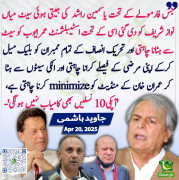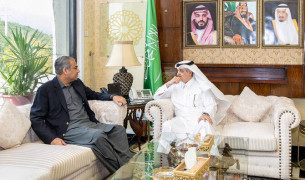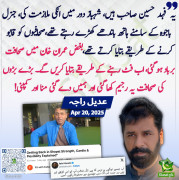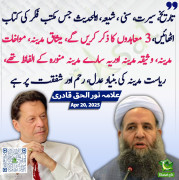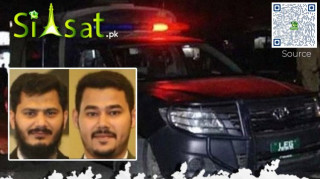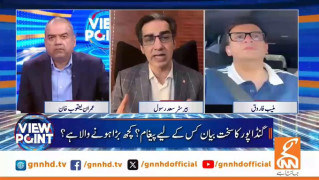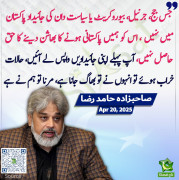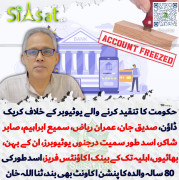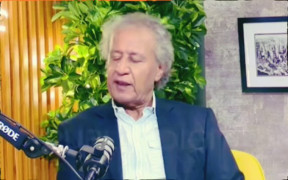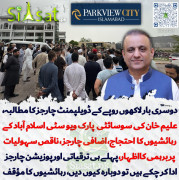- Featured Thumbs
- https://pbs.twimg.com/media/F98e2bua0AAOedA.png
You are using an out of date browser. It may not display this or other websites correctly.
You should upgrade or use an alternative browser.
You should upgrade or use an alternative browser.
The top ten blunders, failures of Pk Establishment in last 2.5 years
- Thread starter Azaadi
- Start date
wasiqjaved
Chief Minister (5k+ posts)
- Journalists were allegedly abducted or even killed due to transnational repression.
- Media outlets were reportedly instructed not to display Imran Khan’s face or name, referring to him only as “Chairman PTI.”
- PTI workers were forced to leave the party; those who refused faced raids, torture of family members, and destruction of property.
- Imran Khan has been imprisoned since 5 August 2023 and subjected to torture, with his party dismantled and his family maligned by the establishment.
- Khan was convicted over an allegedly “illegal” marriage for insufficient “iddat” period — a case considered unprecedented in Islamic history — leading to seven-year sentences for both Khan and Bushra Bibi.
- PTI members who gave press conferences on certain TV channels faced no legal action, whereas others were penalized.
- PTI’s cricket bat symbol was revoked during the February 2024 elections, with the Election Commission citing lack of intra-party elections; no other party faced similar scrutiny.
- New PTI factions were created to dilute Imran Khan’s influence; Khan himself faces roughly 200 criminal cases deemed politically motivated.
- Many PTI workers were tortured, and some abandoned politics due to military harassment.
- PTI supporters forced to run as independents claim vote manipulation occurred via “Form 47” despite “Form 45” indicating PTI support.
- Maulana Fazlur Rehman stated on live TV that Generals Bajwa and Faiz Hameed orchestrated Khan’s ouster in April 2022 at the Biden administration’s behest, referencing a cipher linked to Donald Lu. Bajwa later admitted to decades of military meddling in politics.
- During the 24–27 November 2024 protests at D-Chowk, the government and military were accused of mocking deceased protestors; bodies showed bullet wounds during funerals.
- Internet and cellphone services were shut down nationwide during the February 2024 elections and the November 2024 Islamabad protest, allegedly to control the information flow.
- Multiple independent journalists reported direct firing on unarmed demonstrators by uniformed military personnel, including sniper use.
- All major motorways were simultaneously sealed under “construction,” an event considered unprecedented in Pakistan.
- A new $135 million Chinese-backed internet firewall was hastily tested, causing widespread service disruptions; the Director General of ISPR threatened legal action against any outlet “creating a distance” between the Army and the people.
- PTI workers charged with “Attacking Jinnah House” received up to 10-year sentences via military courts, with trials condemned by the US, UK, and EU for lack of transparency.
- Military leadership frequently labels Imran Khan and supporters as “انتشاری ٹولہ” (“agents of chaos”) in official communications, suggesting bias.
- The Army exerts broad economic influence through ventures like the Fauji Group, benefiting from government concessions and opaque auditing.
- One general was alleged to have gone from middle-class status to billionaire in six years; no general has faced conviction for corruption or war crimes.
- A national boycott movement targets Army-affiliated businesses, accusing them of suppressing civilians and profiting under state favor.
- Richard Grenell, linked to a future Trump administration, openly denounced the charges against Imran Khan as politically motivated.
- Despite calls for “national unity,” the government continues to target Pakistan’s largest political party, which observers view as contradictory.
- After the Islamabad protest, bodies and medical records were reportedly confiscated under military control; some families later received bodies labeled “road accident” victims, though bullet wounds were discovered during funeral rites.
Last edited:
-
-
-
-
بڑے بڑوں کی صحافت یہ رجیم کھا گئی
4 | FORUM -
ریاست طیبہ ہے یا ریاست مدینہ
1 | FORUM
-
-
© Copyrights 2008 - 2025 Siasat.pk - All Rights Reserved. Privacy Policy | Disclaimer|


